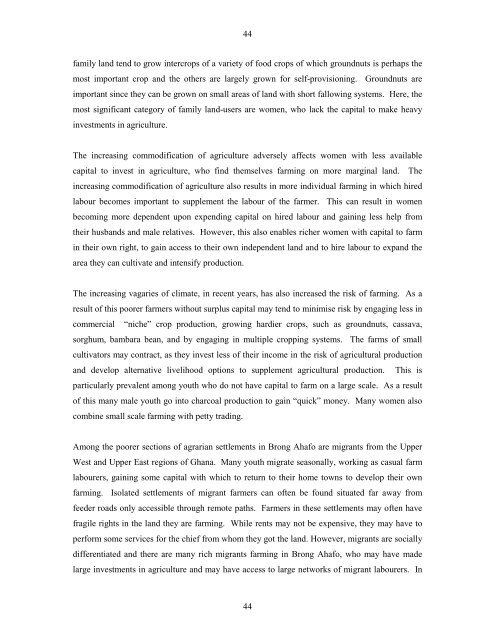Poverty Dimensions of Public Governance and Forest Management ...
Poverty Dimensions of Public Governance and Forest Management ...
Poverty Dimensions of Public Governance and Forest Management ...
Create successful ePaper yourself
Turn your PDF publications into a flip-book with our unique Google optimized e-Paper software.
44<br />
family l<strong>and</strong> tend to grow intercrops <strong>of</strong> a variety <strong>of</strong> food crops <strong>of</strong> which groundnuts is perhaps the<br />
most important crop <strong>and</strong> the others are largely grown for self-provisioning. Groundnuts are<br />
important since they can be grown on small areas <strong>of</strong> l<strong>and</strong> with short fallowing systems. Here, the<br />
most significant category <strong>of</strong> family l<strong>and</strong>-users are women, who lack the capital to make heavy<br />
investments in agriculture.<br />
The increasing commodification <strong>of</strong> agriculture adversely affects women with less available<br />
capital to invest in agriculture, who find themselves farming on more marginal l<strong>and</strong>. The<br />
increasing commodification <strong>of</strong> agriculture also results in more individual farming in which hired<br />
labour becomes important to supplement the labour <strong>of</strong> the farmer. This can result in women<br />
becoming more dependent upon expending capital on hired labour <strong>and</strong> gaining less help from<br />
their husb<strong>and</strong>s <strong>and</strong> male relatives. However, this also enables richer women with capital to farm<br />
in their own right, to gain access to their own independent l<strong>and</strong> <strong>and</strong> to hire labour to exp<strong>and</strong> the<br />
area they can cultivate <strong>and</strong> intensify production.<br />
The increasing vagaries <strong>of</strong> climate, in recent years, has also increased the risk <strong>of</strong> farming. As a<br />
result <strong>of</strong> this poorer farmers without surplus capital may tend to minimise risk by engaging less in<br />
commercial “niche” crop production, growing hardier crops, such as groundnuts, cassava,<br />
sorghum, bambara bean, <strong>and</strong> by engaging in multiple cropping systems. The farms <strong>of</strong> small<br />
cultivators may contract, as they invest less <strong>of</strong> their income in the risk <strong>of</strong> agricultural production<br />
<strong>and</strong> develop alternative livelihood options to supplement agricultural production. This is<br />
particularly prevalent among youth who do not have capital to farm on a large scale. As a result<br />
<strong>of</strong> this many male youth go into charcoal production to gain “quick” money. Many women also<br />
combine small scale farming with petty trading.<br />
Among the poorer sections <strong>of</strong> agrarian settlements in Brong Ahafo are migrants from the Upper<br />
West <strong>and</strong> Upper East regions <strong>of</strong> Ghana. Many youth migrate seasonally, working as casual farm<br />
labourers, gaining some capital with which to return to their home towns to develop their own<br />
farming. Isolated settlements <strong>of</strong> migrant farmers can <strong>of</strong>ten be found situated far away from<br />
feeder roads only accessible through remote paths. Farmers in these settlements may <strong>of</strong>ten have<br />
fragile rights in the l<strong>and</strong> they are farming. While rents may not be expensive, they may have to<br />
perform some services for the chief from whom they got the l<strong>and</strong>. However, migrants are socially<br />
differentiated <strong>and</strong> there are many rich migrants farming in Brong Ahafo, who may have made<br />
large investments in agriculture <strong>and</strong> may have access to large networks <strong>of</strong> migrant labourers. In<br />
44
















